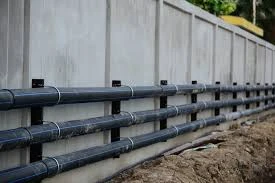Okt . 11, 2024 11:29 Back to list
electrical pvc pipe
Understanding Electrical PVC Pipes Applications and Advantages
Electrical installations are crucial in modern infrastructure, and the materials used for these systems have a significant impact on performance, safety, and longevity. Among various options available today, electrical PVC (Polyvinyl Chloride) pipes have emerged as a preferred choice for many electricians and engineers. These lightweight, durable, and versatile tubes play an integral role in protecting and housing electrical wiring in residential, commercial, and industrial settings. This article explores the applications, advantages, and considerations surrounding electrical PVC pipes.
Applications of Electrical PVC Pipes
Electrical PVC pipes are primarily used to route and protect electrical cables in various environments
. Their versatility allows them to be employed in multiple scenarios, including1. Residential Wiring In homes, electrical PVC pipes provide a safe conduit for wiring, preventing potential damage from moisture, pests, and physical impacts. 2. Commercial Buildings In commercial settings, these pipes are often utilized in walls and ceilings to conceal wiring, thus maintaining a clean and organized appearance while providing access to electrical systems when needed. 3. Industrial Applications Factories and large-scale industrial facilities frequently use electrical PVC pipes to create extensive networks of electrical wiring that need to be organized and safeguarded against harsh conditions.
4. Outdoor Installations Electrical PVC pipes are also suitable for outdoor installations where UV resistance is vital. These pipes can survive exposure to sunlight without degrading, making them ideal for outdoor electrical conduits.
5. Underground Wiring In scenarios requiring underground wiring, such as in garden lighting or street lighting, electrical PVC pipes act as excellent protectors against moisture and soil-related pressures.
Advantages of Electrical PVC Pipes
1. Durability and Strength One of the standout features of PVC pipes is their resistance to corrosion, chemicals, and moisture. This durability ensures that the wiring within the pipes remains protected over the long term, minimizing maintenance costs.
2. Lightweight and Easy to Handle Compared to traditional materials like metal, PVC pipes are significantly lighter, which makes them easier to transport, install, and manipulate during construction. This attribute not only saves on labor costs but also expedites the installation process.
3. Cost-Effective PVC pipes are generally more affordable than many alternative materials. Their ease of installation further contributes to cost savings, as fewer specialized tools and less labor are needed to complete the project.
electrical pvc pipe

4. Electrical Insulation Being non-conductive, PVC pipes provide excellent electrical insulation. This feature safeguards against accidental electrical shocks and strengthens the overall safety of the electrical system.
5. Low Maintenance Once installed, electrical PVC pipes require minimal maintenance. They do not rust, corrode, or deteriorate the way some metallic pipes can in harsh conditions, ensuring they continue to function effectively over the years.
6. Fire Resistance While PVC is not completely fireproof, it has good fire-resistance properties, which helps slow down the spread of flames in case of a fire incident, enhancing safety in buildings.
Considerations When Using Electrical PVC Pipes
While electrical PVC pipes are advantageous, there are a few considerations that professionals should keep in mind
1. Temperature Sensitivity PVC pipes can become brittle in extremely low temperatures and may lose rigidity under high heat. Therefore, proper installation and placement are crucial to maximize lifespan.
2. Environmental Impact Although PVC is widely used, it is a plastic material. Consideration should be given to its environmental impact and disposal methods at the end of its life cycle.
3. Local Codes and Regulations It's essential to comply with local building codes and electrical regulations when using PVC pipes for electrical installations. Not all jurisdictions may allow PVC for certain applications.
Conclusion
In conclusion, electrical PVC pipes are an excellent choice for various electrical applications, offering numerous benefits such as durability, ease of installation, cost-effectiveness, and electrical insulation. Their versatility makes them suitable for residential, commercial, and industrial uses. However, it’s essential for electricians and engineers to consider environmental factors and local regulations when opting for PVC piping in their electrical projects. Ultimately, with the right understanding and application, electrical PVC pipes significantly contribute to the safety and efficiency of modern electrical systems.
-
Durable PP Rigid Sheet: Lightweight, Chemical Resistant Solutions
NewsAug.21,2025
-
PVC Grey Sheet for Extraction: Chemical Resistant & Durable
NewsAug.19,2025
-
Durable PVC Pipe Fittings for Plumbing & Irrigation Needs
NewsAug.18,2025
-
HDPE Steel Belt Reinforced Spiral Corrugated Pipe | High Strength
NewsAug.17,2025
-
HDPE Pipe Fittings: Durable, Leak-Proof Solutions
NewsAug.16,2025
-
Premium CPVC Sheet: High-Temp & Chemical Resistant Solutions
NewsAug.15,2025

